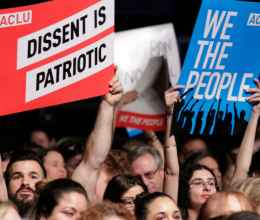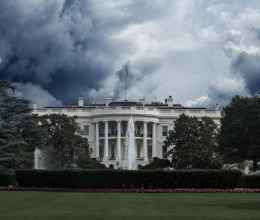
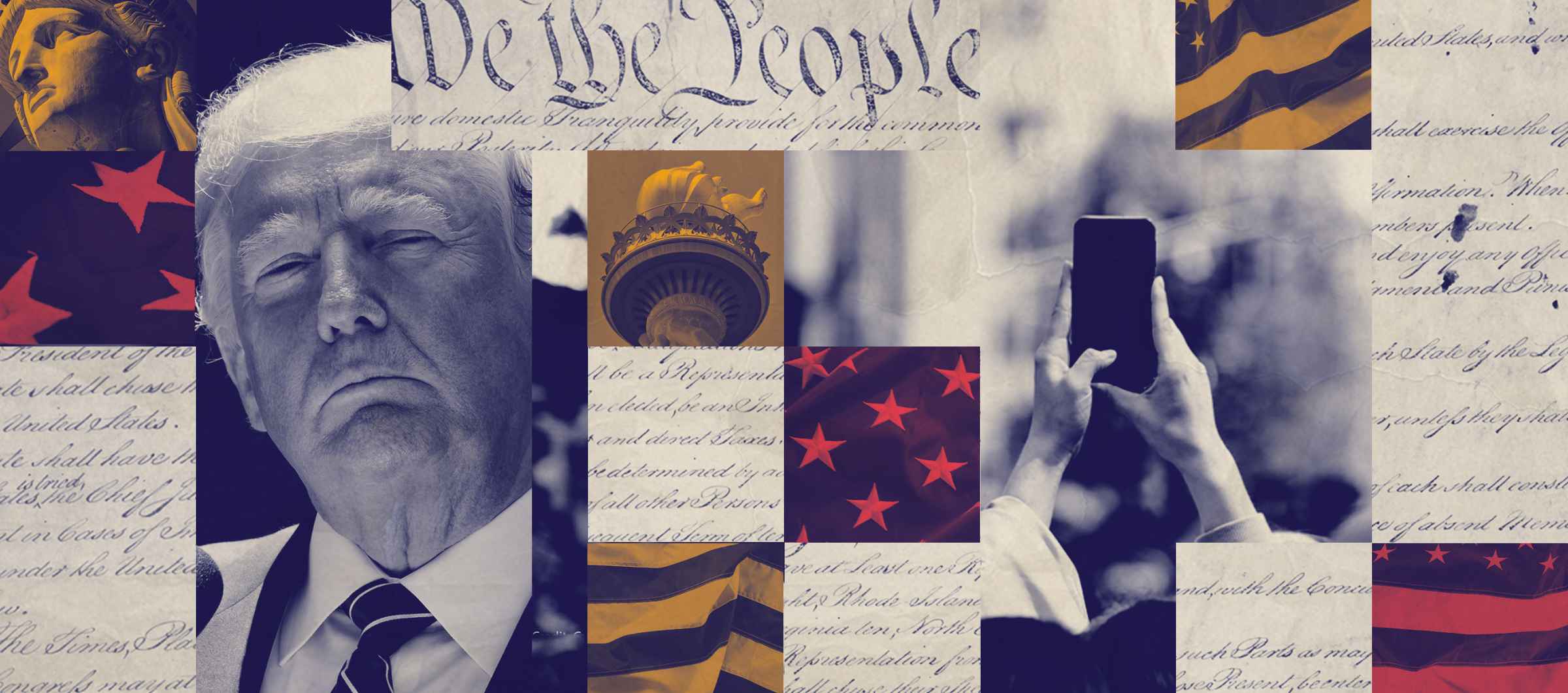
Memo: Trump on Surveillance, Protest, and Free Speech
Abusing Executive Power
Trump has threatened to abuse his power in these ways by using DOJ and other agencies to indict political opponents, replacing civil servants with ideologues who will do his bidding, and demanding loyalty pledges from civil service employees.
Enforcing the law is the central role of the executive branch, regardless of who is president, and that constitutional role entails exercising the government’s coercive powers to investigate and pursue sanctions, including by depriving individuals and organizations of property and freedom. That capacity, and the threat of force behind it, puts massive power in the hands of federal government officials. Many agencies and departments in the federal government have such power — including the Departments of Justice (DOJ) and Homeland Security, as well as a wide range of banking and economic regulators.
Even when a person targeted for a federal prosecution or enforcement action prevails or an investigation does not lead to prosecution, the consequences can be ruinous to the target’s reputation and livelihood. Executive branch officials therefore wield enormous discretion when they decide which investigations to pursue, with potentially devastating consequences for individual rights. This means that a president who flouts laws and norms governing the exercise of these executive powers can wreak havoc. Just as a police officer on traffic patrol can use pretextual stops to harass and discriminate, federal agents can abuse their power by directing accusations, surveillance, investigations, and prosecutions at the administration’s will to target political opponents or discriminate against vulnerable communities. Some of the most insidious abuses are exercises of legitimate powers in illegitimate ways or for illegitimate purposes.
Donald Trump has already threatened to abuse his power in these ways. He plans to leverage the DOJ and other governmental agencies to indict political opponents, replace civil servants and traditionally apolitical appointees with individuals willing to do his bidding regardless of legal and normative structures, and demand pledges of loyalty from civil service employees.
Since President Richard Nixon was held accountable for deploying the DOJ against his political enemies, the department’s independence has been a fundamental norm preventing presidents from overstepping. Yet Trump has asserted that, as president, he has “an absolute right” to do what he wants with the DOJ. The Supreme Court recently removed one guardrail in Trump v. United States, ruling that the president cannot be criminally prosecuted for “official acts,” including actions taken through the DOJ. Trump can use a politicized DOJ by dropping civil rights enforcement cases and instead bringing abusive cases attacking voters, protestors, journalists, abortion care providers and patients, and others he perceives as enemies.
If we take Trump at his word, he will not stop with the DOJ. During his presidency, he instructed governors to deploy the National Guard to “dominate the streets” in response to the 2020 racial justice protests, threatened to unleash the military on protestors, and called out the National Guard to disrupt peaceful protests in Washington, D.C. He has threatened to do so again, repeatedly asserting that he will invoke the National Guard or the U.S. military to stop civil demonstrations in cities and states across the country. He has aimed his comments at major cities with relatively large populations of people of color and immigrants, including Washington, D.C., Chicago, and New York. Trump has also indicated that he wants to do away with the existing limits on his ability to use the military at home to suppress and punish the people and places he views as his political enemies, asserting unilateral power to deploy the military domestically.
Similarly, while Trump was president, federal law enforcement agents — including a militarized unit of U.S. Customs and Border Protection (CBP) and U.S. Marshals Service agents — were deployed in Portland, Oregon, to stifle protests. They unlawfully arrested journalists and legal observers. CBP officials claimed that they were not subject to the same constitutional limits as other law enforcement agents. Trump’s Attorney General William Barr used joint federal-state law enforcement partnerships to conduct “counterterrorism” investigations against protestors.
In service of his agenda, Trump can also exploit the executive branch’s vast and unprecedented powers to spy on Americans’ lives with dragnet surveillance of our data. Through Big Brother surveillance programs like Section 702 of the Foreign Intelligence Surveillance Act (FISA) and Executive Order 12333, which result in mass collection of our private data, and the government’s purchase of massive quantities of data from commercial brokers, the federal government can search our private communications and information without a warrant and without meaningful safeguards necessary to protect our rights. There is already a history of law enforcement and intelligence agencies’ abuse of these tools. It is all too easy to foresee Trump using these overbroad and dangerous spying powers to surveil and discriminate against political opponents and people and communities already in his crosshairs — protestors, communities of color, immigrants, and people seeking abortions or gender-affirming care all face even greater risks to their privacy and rights.
This memorandum analyzes Trump’s potential abuse of executive authority, as well as the ACLU’s planned response, in three areas:
- Abusive deployment of the military and federal law enforcement agencies to quell protest and freedom of the press;
- Politically motivated investigations; and
- Big Brother surveillance and prosecutions.
Use the expandable cards below to learn about specific threats and our potential responses.
Overall Response
The ACLU will resist a second Trump administration’s efforts to abuse executive power with litigation and legislative and policy advocacy at both the state and federal levels.

COURTS
When Trump previously deployed federal agencies and the National Guard against protestors, the ACLU brought lawsuits challenging violations of protestors’ and journalists’ First and Fourth Amendment rights, and we will do so again. We will ensure that Trump’s efforts to silence dissenters — and the journalists who report on that dissent — will not go unanswered.
The ACLU will also rise to defend protestors, journalists, and others who are subjected to abusive criminal prosecutions or other law enforcement and intelligence agency actions, and we will seek redress through affirmative litigation when federal law enforcement agencies misuse their coercive powers in ways that illegally breach Americans’ privacy, discriminate based on race or ethnicity, or retaliate against dissenters or seek to silence them.
CONGRESS
When the founders wrote the Constitution, constraining a rogue executive and preventing a president from becoming a dictator were paramount concerns. The separation of powers was intended to impose limits on presidential power,14 and Congress should play a key role in seeking to defend rights and freedoms in a Trump administration.
Unfortunately for our system of checks and balances, Congress has for decades too often ceded authority to the executive branch, and congressional dysfunction has emboldened presidents of both parties to take expansive executive actions in order to deliver on policy priorities Congress has proven unable to address. This trend won’t be easily reversed in a new administration, but Congress continues to wield important tools, particularly when it can use the threat of inaction as leverage. The Trump administration will need congressional action to avoid government shutdowns and to reauthorize key laws, and we will seek to use the appropriations process and reauthorization fights to put guardrails on executive authorities.
As we have done successfully in the past, we will push Congress to use its leverage to safeguard civil liberties. The ACLU has worked for years to build a bipartisan coalition both inside and outside of Congress to limit overly broad surveillance and investigative powers. During the Trump administration, this coalition pushed Congress to allow two major surveillance authorities to expire. In response to the Trump administration’s use of shadowy, unidentified federal law enforcement officers to attack protesters in 2020, the ACLU helped draft and push through a new law requiring federal law enforcement officers to display their agency’s name, as well as their own name or badge number, when present at protests. We also urged key congressional committees to step up their oversight over the executive branch.
We will work to change the politics around the First Amendment and individual liberty so politicians are more likely to defend them. Members of both parties have been quick to empower the executive branch in the name of national and homeland security in the post-9/11 era. The ACLU is already responding to current and promised attacks on students, nonprofits, and political opposition, and rallying allies around the need for robust separation of powers, strong due process protections, and limits on executive power.
STATES, CITIES, AND TOWNS
In a second Trump administration, state and local leaders who value civil liberties must take a lead role in resisting abuses of federal executive power. States do not directly influence the federal surveillance and law enforcement infrastructure, but they can limit the reach of the federal government within their jurisdictions. For example, states can limit — or eliminate — cooperation agreements between state and local law enforcement and federal law enforcement to minimize the grounds on which federal authorities can intervene in protests. They can also prevent voluntary data sharing that could be used for federal surveillance purposes or to support politically motivated investigations and prosecutions.
Perhaps most significantly, governors and mayors can present an important counternarrative to the Trump administration’s pretextual excuses for its politically motivated abuses of executive power. The federal government’s goal will be to divide and conquer — to persecute specific individuals, organizations, or groups that are unlikely to generate public sympathy but whose fate can serve as a warning to others and more broadly chill protest and dissent. We will need elected leaders to forcefully speak out in defense of freedom of speech, the right to organize and protest, and the validity of political opposition. Their words and actions, especially if coordinated, can blunt the dystopian narrative a Trump administration will try to build and provide an alternative vision of governance built on freedom and rights for people to rally around. The ACLU will push state and local leaders to champion civil rights and civil liberties in the face of a federal government seeking to silence dissent and attack political opponents.
Threat: Abusive deployment of the military to quell protest and freedom of press
In the past, Trump has used National Guard troops to stop protestors, and we anticipate that he will do so again.
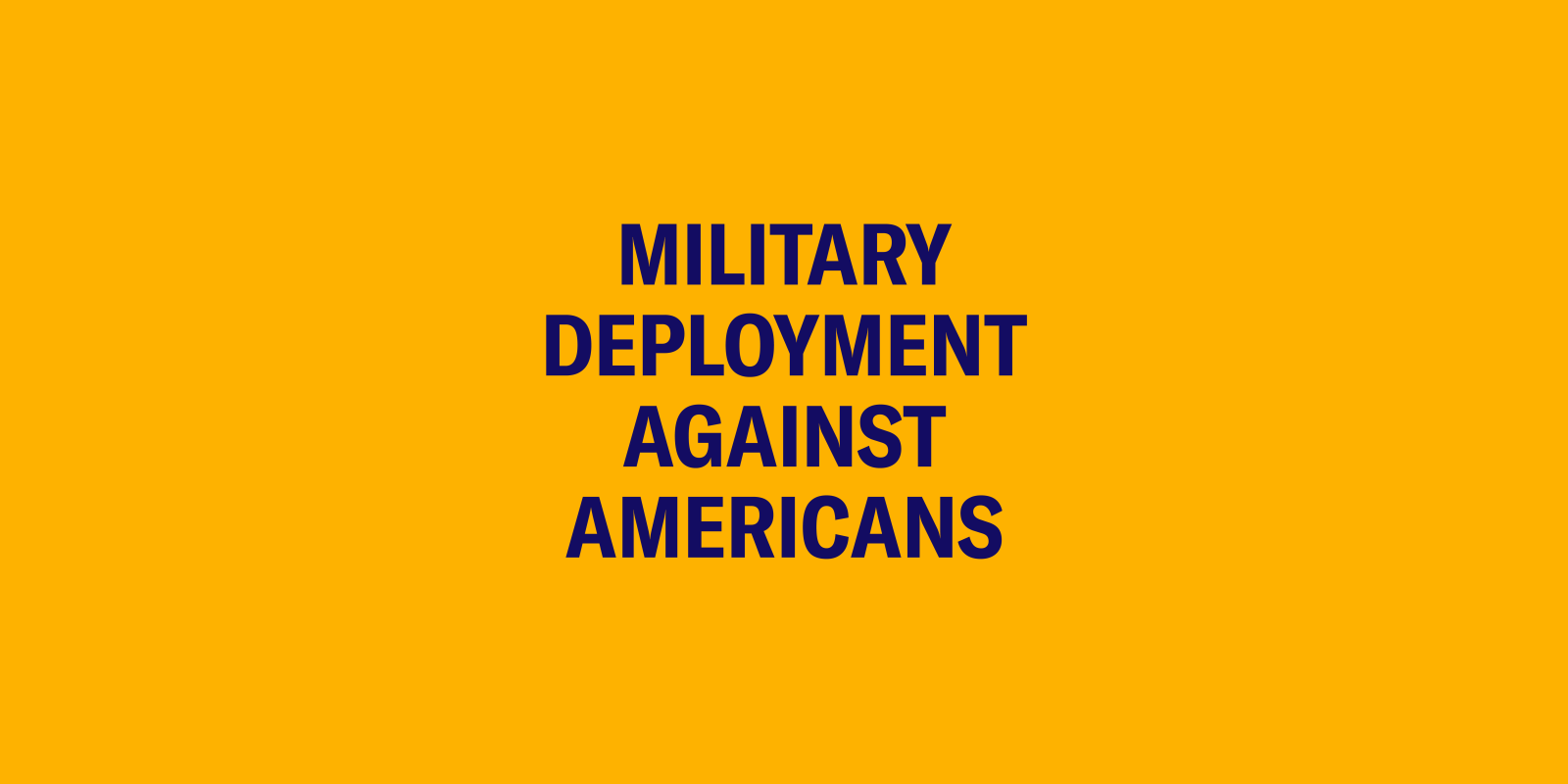
Early in his presidency, Trump sent National Guard troops to stop Black Lives Matter protestors in Washington, D.C., threatened to deploy the military more broadly to quell protests in U.S. cities, and sent federal law enforcement agents into cities around the United States to break up protests by force and by arresting protestors and journalists.
Trump particularly mounted a visible and threatening show of force in immigrant communities and municipalities and states that he deemed to be opposed to his extreme policies. We anticipate that he will do so again, and we are prepared to challenge his actions.
For example, in Portland, Oregon in 2020, federal agents deliberately attacked protestors and journalists — who were visibly identified as members of the press — by shooting them with rubber bullets, spraying their faces with pepper spray, beating them with batons, throwing flash-bang grenades at them, and arresting them. During other Black Lives Matter protests, similar attacks by federal agents were reported around the country.
In response, the ACLU of Oregon brought multiple lawsuits against the U.S. Department of Homeland Security and U.S. Marshals Service for their violent attacks on Black Lives Matter protestors and journalists who were covering the protest in Portland. The ACLU also brought two more lawsuits in Washington, D.C. and Minneapolis on behalf of protestors who were similarly violently attacked by federal law enforcement agents.
This abuse is likely to recur and even escalate in a second Trump administration. Trump has already announced that he plans to deploy the military to “inner cities,” sounding a racist dog whistle, should he win re-election. He might also use federal law enforcement agents at polling places during future elections, ostensibly to prevent voter fraud, but really to intimidate voters and election workers, and particularly voters of color.
This anticipated escalation of abuses underscores the urgent need for robust legal and advocacy efforts to protect the rights to protest and press freedom.
RESPONSE TO MILITARY DEPLOYMENT: LEGAL ANALYSIS & LITIGATION
The founders recognized that military interference in the government is a fundamental threat to freedom. They ensured that the Constitution addressed that problem by separating the military from civilian government. A long-standing criminal statute, the Posse Comitatus Act of 1878 (PCA), explicitly prohibits the use of federal military forces “to execute the law” unless “expressly” authorized by the Constitution or an act of Congress. Congress has enacted statutory exceptions to the PCA in the Insurrection Act, 10 U.S.C. §§ 251–55.
Through the Insurrection Act, which has existed in some form for 150 years, Congress has delegated to the president considerable power to suppress insurrection or to enforce federal authority. Historically, presidents have invoked the Insurrection Act to deploy either active-duty federal military units or “federalized” National Guard units (1) at the request of a state; or (2) on their own without a request from a state (and sometimes even over the state’s objections to federal intervention), including to counter state resistance to civil rights protections and court-ordered desegregation. Still, if Trump were to invoke the Insurrection Act to suppress lawful protest it would be an unprecedented and unconstitutional abuse of power — with foreseeable violations of protestors’ and journalists’ rights under the First Amendment and Fourth Amendment.
The right to join with fellow citizens in protest or peaceful assembly is critical to a functioning democracy and at the core of the First Amendment. The First Amendment protects the right to protest irrespective of whether local or federal law enforcement officers are seeking to suppress it. The ACLU has been litigating protest cases for a century, and we will be at the forefront of defending this most crucial right against any incursions.
Should the Trump administration again deploy the military and federal agents to quell peaceful protest and interfere with journalists reporting on protests, the ACLU and our affiliate network will be on the ground to fight back. As we did during Trump’s presidency the first time around, we will bring lawsuits on behalf of protestors and the media, likely raising both First Amendment claims (for violations of freedom of speech and association) and Fourth Amendment claims (for unlawful arrest and excessive force). Where the federal government follows up on policing violations at protests with abusive investigations and prosecutions, we will provide advice and counsel and, where feasible, legal representation.
RESPONSE TO MILITARY DEPLOYMENT: LEGISLATIVE ADVOCACY
Congress should amend the Insurrection Act, which is a loaded gun in the hands of a president like Trump. Historically, the American people have relied on presidents and other federal officials to act within norms of executive power. Like other authorities that Trump abused during his presidency, such as Section 212(f) of the Immigration and Nationality Act and the National Emergencies Act, which Trump used, respectively, to establish Muslim and refugee bans and illegally divert military construction funds to build border wall segments that Congress had refused to fund, the Insurrection Act should be narrowed to prevent such abuses from recurring. For example, there should be narrow, clearly defined conditions that must be met prior to invoking the Insurrection Act, and deployments under the Insurrection Act should be time-limited and subject to judicial review. There are proposals with bipartisan support and the ACLU will be engaged with allies to pursue any legislative opportunity.
RESPONSE TO MILITARY DEPLOYMENT: LOCAL & STATE ADVOCACY
The ACLU will urge states and localities to review and end or limit participation in joint federal and state and local task forces — like joint terrorism task forces and fusion centers — that enable federal authorities to coordinate with or mobilize state and local resources in abusive surveillance and investigations. We will also urge state and local governments to institute and follow best practices on the role of law enforcement during protests. If the administration inappropriately invokes the Insurrection Act to deploy the military in American cities, the ACLU will work with state and local authorities and allies to build a robust political defense of our constitutional freedoms.
Threat: Targeting political opponents with investigations and prosecutions
Donald Trump has not been shy about threatening his perceived enemies.
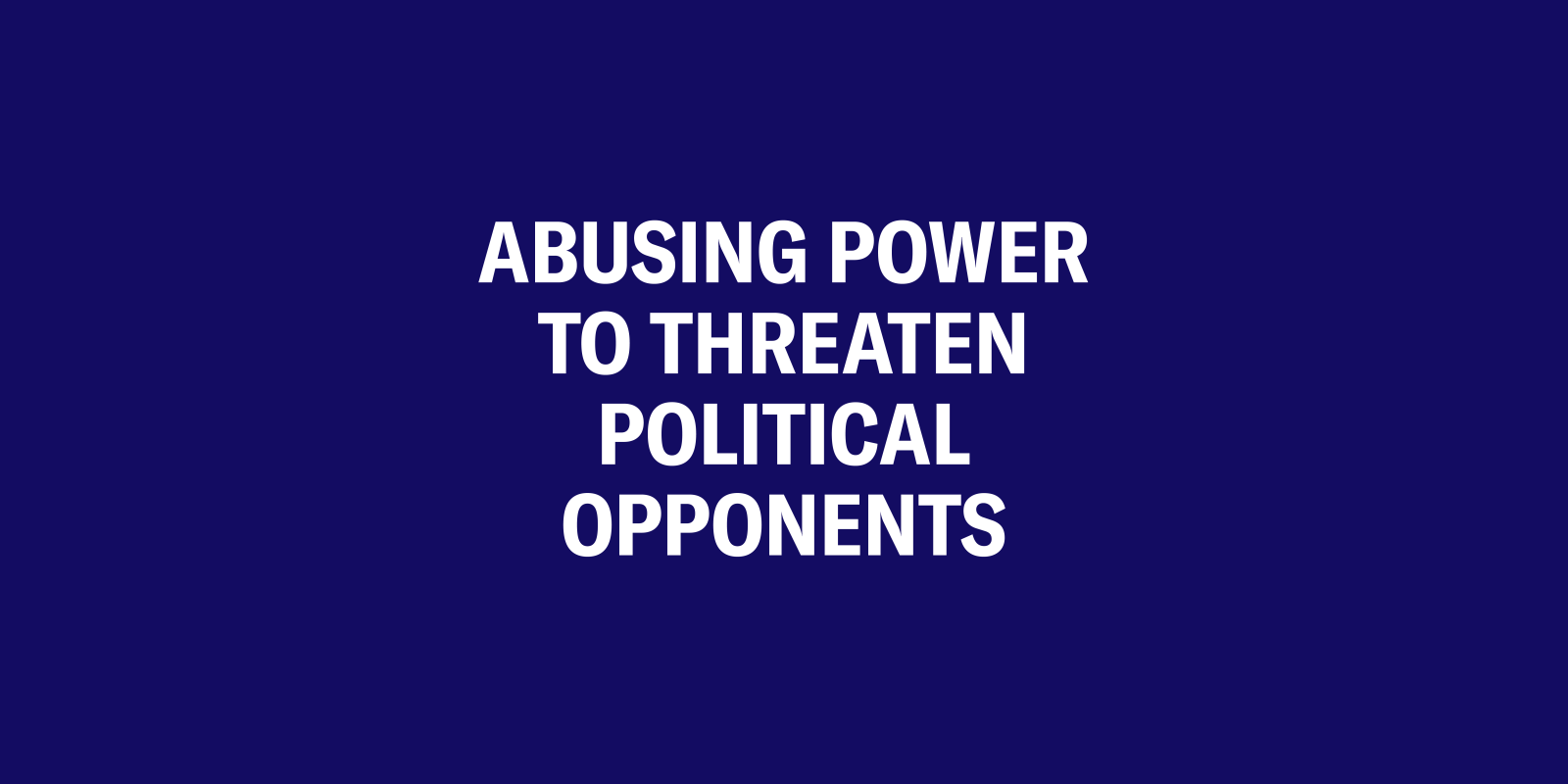
Donald Trump has threatened prosecution or violence towards President Joe Biden and Biden administration officials, poll workers, former generals, former officials in his own administration who fell out of favor, protesters, journalists, migrants, and many others.
Trump made clear in his first term that he wanted to use the government’s powers to reward friends and punish enemies. As a candidate, Trump pledged to oppose a CNN-AT&T merger because “CNN was anti-Trump,” and the Trump White House later pulled press passes for CNN and dozens of other media organizations. In 2019, Trump pushed the DOJ to open investigations into four intelligence officials whom he accused of “treason” for their involvement in investigating the connections between Russia and the Trump campaign. He even called on the Postmaster General to double Amazon’s shipping rates to punish Jeff Bezos for The Washington Post’s coverage of Trump.
Some of Trump’s efforts to exert such political or even personal control over the vast prosecutorial powers of the federal government were resisted by officials in his administration. For example, Attorney General Bill Barr declined to prosecute former FBI Director James Comey and others despite Trump’s urging. But if Trump wins a second term, it is likely he will install officials who will put up no resistance to such abuses of power. Jeffrey Clark, who offered to use the DOJ to support the effort to steal the 2020 election, is reportedly in the running to be attorney general. The Heritage Foundation has suggested that Trump use an employment screening questionnaire to demand fealty to Trump’s lies about the 2020 election as a litmus test for White House employment. And Project 2025 is openly proposing to take down existing guardrails aimed at strictly limiting White House influence at the DOJ.
Even now, Trump allies in Congress are trying to use their investigative tools to chill free speech and target their opposition. In May 2024, two House committee chairs sent a letter to Treasury Secretary Janet Yellen seeking “Suspicious Activity Reports” on named organizations, including some major foundations, that have been or might have been involved in organizing or funding campus protests over the war in Gaza. This fishing expedition was designed to divert these organizations’ time and money to deter their political advocacy.
As president, with federal law enforcement agencies under his control, Trump could carry out his own coercive attacks on advocacy organizations and individuals he opposes. Indeed, on the campaign trail, Trump has praised violent crackdowns on campus protests, aligning with his previous attacks on academic freedom. In particular, he has threatened reprisals against students who are not U.S. citizens, merging his attacks on free speech with his attacks on immigration. In mid-May, he said, “One thing I do is, any student that protests, I throw them out of the country. You know, there are a lot of foreign students. As soon as they hear that, they’re going to behave.”
Trump is likely to attack online protest as well by forcing media companies and online platforms to carry conservatives’ preferred speech. In 2020, Trump sought to compel the Federal Communications Commission to overstep its legal authority and substantially overhaul the law that allows platforms to take down hateful and “objectionable” speech without fear of frivolous litigation. That effort attacked “ideologically driven content moderat[ion] decisions,” including decisions to remove “content pertaining to firearms,” “glorifying violence,” or “a controversial paper about a potential therapy for COVID-19.” Platforms’ decisions to restrict that content are well within their First Amendment editorial rights, but the Trump administration will almost certainly endeavor to force platforms to carry objectionable speech.
Trump may also abuse legal processes through the DOJ to attack the press and sources including whistleblowers. Current DOJ policy prohibits the use of subpoenas, search warrants, and other orders to obtain information collected by journalists during newsgathering, with narrowly tailored exceptions. That guidance was issued in November 2022 and replaced an earlier policy that expressly permitted the use of subpoenas, warrants, and other orders, only requiring authorization from the attorney general. The first Trump administration was “markedly more aggressive” than previous administrations in abusing that authority, and it is likely a second Trump administration would seek to eviscerate these prudential constraints and use the full power of the DOJ to root out sources such as whistleblowers within the federal government, including by surveilling journalists.
Finally, we should expect to see stepped-up use of the Espionage Act of 1917 to prosecute government leakers and, in the worst-case scenario, reporters and publishers. The Trump DOJ under Jeff Sessions already broke with longstanding precedent when it brought felony charges against Wikileaks publisher Julian Assange for possessing and publishing secret government documents —an activity that is central to investigative journalism. Media organizations have rightly warned that the Assange prosecution, which recently resulted in a guilty plea, will offer a blueprint for targeting more mainstream publications that routinely expose government malfeasance in the public interest.
The Supreme Court’s decision in Trump v. U.S. immunizing Trump (and any future president) from criminal prosecution for any “official” act, including his efforts to subvert the DOJ toward his own ends, makes it all the more important that civil society organizations and other potential targets of Trump’s vendettas be extra vigilant in holding him, and any abusive process brought by his DOJ, accountable.
RESPONSE TO TARGETING POLITICAL OPPONENTS: LEGAL ANALYSIS & LITIGATION
The founders were committed to constraining executive power and enshrined the principle of due process and structural checks and balances in the Constitution. The Due Process Clause of the Fifth Amendment is a crucial bulwark against misuse of executive power. Unfortunately, litigation often comes too late to prevent the harms of an abusive investigation or prosecution and can only seek a retrospective remedy — clearing a target’s name in the public eye and seeking redress for the damage already done. Even if a target for retaliation sues and ultimately wins, the stigma and more direct harms of a retaliatory federal investigation or prosecution can destroy a person’s life or an organization’s finances. Moreover, defending against a criminal case or seeking damages for abusive legal process requires meeting a stringent legal standard: Proving that the prosecution had an improper motive and a discriminatory impact. That is, the person who was unfairly prosecuted must prove retaliatory or discriminatory intent and that other people in the same situation were not prosecuted.
Despite the challenging legal standard, the ACLU has stood up with and for people who were unfairly investigated or prosecuted for retaliatory or discriminatory reasons, or to try to silence their advocacy. We have represented individuals both in defending against criminal prosecution and in affirmative lawsuits seeking justice. For example, the ACLU has represented Asian American scientists who were wrongfully arrested by the FBI and falsely painted as Chinese spies during a wave of biased prosecutions that began under the Obama administration and grew into the Trump administration’s discriminatory “China Initiative.” President Biden ended the China Initiative in February 2022, but there is a high likelihood that Trump would revive it.
The role of the free press in exposing these abuses will be vital and will often depend on courageous government whistleblowers sharing confidential information in the public interest. If Trump’s prior presidency is any indication, we can expect aggressive attacks on both journalists and their sources. The ACLU stands ready to support and defend both journalists and whistleblowers who are subjected to overzealous investigation and prosecution.
RESPONSE TO TARGETING POLITICAL OPPONENTS: STRENGTHENING FIREWALLS AGAINST POLITICAL INFLUENCE
There are longstanding norms and rules to shield the DOJ from political interference, but Trump has made clear since the early days of his first term that he is eager to shred those norms. In fact, he fired his first attorney general, Jeff Sessions, for failing to act in Trump’s interest. Project 2025 shows that Trump’s supporters and enablers are eager to help politicize the DOJ should Trump become president.
Norms will not protect us; we need to work for stronger firewalls between the White House and DOJ. While the prospects for legislative action with this Congress are slim, the ACLU has cultivated a bipartisan coalition of civil libertarians on Capitol Hill who recognize the danger of overly broad executive power. Republicans, in particular, during the Biden administration have claimed to be alarmed about political influence over prosecutorial decisions. The ACLU will continue seeking legislative opportunities to install stronger guardrails against political influence over the DOJ.
There are also steps the Biden administration can take to reduce the opportunities for political corruption of agency decision-making or at least raise the cost. A new collective bargaining agreement for Environmental Protection Administration employees includes a provision protecting employees from political interference in their work. In May, media reported that the National Institutes of Health were putting in place new protocols to protect the scientific integrity of the Institutes’ priority-setting and grantmaking. Although a Trump administration could sweep away the new policies, doing so would catch the attention of advocates and the media, acting as something of a tripwire for political pushback. Similar steps can be taken at enforcement agencies.
RESPONSE TO TARGETING POLITICAL OPPONENTS: BOLSTERING PROTECTIONS FOR JOURNALISTS
The ACLU will also work now to get Congress to enact the Protect Reporters from Exploitative State Spying Act (PRESS Act), which would prevent the federal government from compelling journalists to reveal their sources and work product. The PRESS Act also bars the government from spying on journalists’ phone records and search histories through third parties, like internet service providers, as a work-around. By preventing the government from compelling the disclosure of sources, or spying on journalists as a work-around, the PRESS Act ensures journalists across the country have the confidentiality they need to do their jobs. This bipartisan bill already passed the House of Representatives in early 2024 and must pass the Senate before the end of the year.
RESPONSE TO TARGETING POLITICAL OPPONENTS: SHRINKING EXECUTIVE AUTHORITY
Given the danger of targeted fishing expedition investigations and speculative enforcement actions, we need more rather than less oversight over executive branch enforcement. Congress is currently considering, for example, a bill that would empower the Treasury Secretary to designate an organization as “terrorist-supporting” and strip their nonprofit status unilaterally. While the bill purports to require “notice,” it does not require disclosure of all the reasons for designation or the evidence relied upon to support it — or evidence in the government’s possession that might undermine the designation. The legislation raises significant constitutional concerns and would give a Trump administration significant new powers to threaten dire consequences on any organization based on secret evidence without ever providing them a meaningful opportunity to defend themselves before a neutral decisionmaker. The ACLU is working to stop that bill and ensure stronger due process protections in other contexts.
RESPONSE TO TARGETING POLITICAL OPPONENTS: BACKSTOPPING OVERSIGHT BODIES
It can be hard for those without deep expertise to distinguish pretextual prosecutions and investigations from legitimate enforcements of the law. Congress members and agency inspectors general must take a critical oversight role; they must probe and call out when political decision-making is infecting agencies. The ACLU will work to defend and strengthen inspector generals and to support congressional oversight where appropriate.
RESPONSE TO TARGETING POLITICAL OPPONENTS: STRENGTHENING STATE DEFENSES
Targeted prosecutions can take the form of attacks on organizations or individuals who are conducting activities that the administration disfavors, such as prescribing abortion medications or providing support services to asylum seekers. As part of a comprehensive state planning effort, the ACLU is working with our affiliates to put in place the strongest data protection laws possible in civil-liberties-friendly states to reduce these dangers. Many states have already implemented shield laws to prevent assistance to other states’ prosecutions targeting those seeking or providing reproductive health care or gender-affirming care. While the federal government has concurrent jurisdiction in states, the ACLU will be supporting state efforts to update their shield laws to ensure that their personnel and information systems are not complicit in aiding such prosecutions or aiding in federal mass deportation efforts to the maximum extent permitted by law.
RESPONSE TO TARGETING POLITICAL OPPONENTS: REGULATORY ADVOCACY
The ACLU may also leverage administrative advocacy to oppose many of these threats, especially efforts to roll back Section 230 and limit social media platforms’ ability to address hateful speech or mis- and disinformation. The ACLU has long defended Section 230’s protections in federal courts and on the Hill and has experts on both Section 230 and wider telecommunications issues who would be able to underscore the limitations of the Federal Communications Commission’s authority in upending nearly 30 years of precedent. Robust regulatory advocacy would serve as a foundation to challenging a Section 230 rollback in court.
RESPONSE TO TARGETING POLITICAL OPPONENTS: ORGANIZING
Ultimately, the power of the federal government is vast, and the capacity to misuse it for the purposes of locking in political power and undermining the rule of law is a substantial vulnerability. Fighting this threat requires mobilizing the public to value and defend freedom from a tyrannical government just as the founders did when they wrote the Constitution.
The ACLU has always stood for liberty in the face of government overreach, and that mission will arguably be more important in a second Trump administration than it has ever been. We are engaging in a broad campaign within civil society to help key institutional partners, and eventually the public and the media, to recognize and mobilize around the danger. The best way to stop the threat of weaponized prosecutorial powers is to socialize the press, the public, and policymakers to the danger, to reduce the effectiveness of Trump administration pretexts, and to raise the political costs of taking abusive actions in the first place.
Threat: Big Brother Surveillance
The government has vast, unprecedented powers to surveil and peer into people’s private lives by collecting our data and using dragnet methods.

The government has vast, unprecedented powers to surveil and peer into people’s private lives.
The government exploits three sources to conduct dragnet surveillance of Americans’ data: (1) Section 702 of FISA, which authorizes the collection of communications between U.S. persons and people outside the United States; (2) Executive Order 12333, which allows the government to conduct bulk surveillance outside the United State and results in the collection of Americans’ private data; (3) and the government’s use of commercial data brokers to purchase massive quantities of Americans’ private data. Through these dragnet surveillance methods, the federal government searches Americans’ private communications and information without a warrant and without notice or other significant safeguards necessary to protect our rights.
In addition, the information that the government purchases from data brokers without meaningful oversight and transparency can be highly sensitive, and could include:
- Information from individuals’ visits to health clinics,78 as well as reproductive tracking applications installed on people’s phones;
- Information regarding people’s race, ethnicity, gender, sexual orientation, income, and political and religious affiliations; and
- People’s immigration status and related information for immigration enforcement.
According to former deputy director of the CIA Michael Morell, “[t]he information that is available commercially would kind of knock your socks off. If we collected it using traditional intelligence methods, it would be top-secret sensitive. And you wouldn’t put it in a database, you’d keep it in a safe.”
There are few checks on these surveillance powers. Federal agencies rely on them to collect sensitive information without providing a judicial warrant or even notice to individuals whose data has been captured. And the problem is only getting worse, as President Biden recently signed legislation dangerously expanding Section 702. Under that expansion, the government can conscript essentially any business that provides Wi-Fi to its customers into service for spying, unless it qualifies for one of Section 702’s limited exceptions. The Biden administration has promised it will limit its use of this authority, but that does not bind any future administration from doing so.
Each of these tools has a history of abuse by law enforcement and intelligence agencies, and a future president could take advantage of any or all of them for his own ends. Trump could use these overbroad surveillance powers to target immigrants, protestors, communities of color, people seeking abortions or gender-affirming care, or his political opponents. Indeed, although Trump has been a loud critic of FISA, as president, he ultimately signed legislation to reauthorize Section 702 surveillance. Given that track record and Trump’s more recent assertions, there is serious concern that he will try to harness the government’s dangerous spying powers for his own ends.
RESPONSE TO SURVEILLANCE: LEGAL ANALYSIS & LITIGATION
Because the government uses mass warrantless surveillance authorities (Section 702 of FISA and Executive Order 12333) in secret and without disclosure to the people who are surveilled, it is challenging to identify when someone has been subjected to warrantless surveillance. In practice, people whose privacy rights are violated have had very little legal recourse due to the government’s refusal to disclose even basic information about this surveillance and the government’s repeated use of the “state secrets privilege” to thwart court review of its most intrusive spying programs. The government used the latter tactic in our lawsuit on behalf of the Wikimedia Foundation and eight other organizations that challenged the National Security Administration’s (NSA) Upstream surveillance program. Even people who are criminally charged at least in part on the basis of evidence derived via Section 702 and Executive Order 12333 are hard-pressed to understand whether and to what extent their private communications have been intercepted and searched.
Although it can be difficult to challenge Section 702 and Executive Order 12333 surveillance, we have done so in the past, and will continue to do so by carefully monitoring (1) criminal cases where the government has disclosed its use of other types of sensitive surveillance that are often used in parallel with these secret surveillance methods, (2) publicly available government documents such as DOJ press releases, (3) legislative testimony about purported surveillance “successes,” and (4) media reports that provide additional information about the government’s use of controversial surveillance tools. We will work in collaboration with criminal defense attorneys around the country to file motions that seek to compel the government to provide notice to criminal defendants in investigations where agents relied on Section 702 or Executive Order 12333 surveillance. And in cases where criminal defendants have a basis to believe the government used Section 702 or Executive Order 12333 surveillance to intercept and search their communications without a warrant — as in cases like United States v. Muhtorov, United States v. Moalin, United States v. Hasbajrami, and United States v. Russell, where we have served as co-counsel or amicus — we will support defendants in filing motions challenging the lawfulness of that surveillance under the Fourth Amendment and in seeking to suppress the resulting evidence.
By representing defendants who are accused of crimes based on illegally obtained private data, we shed light on the ways in which the government is engaging in mass surveillance of Americans — the vast majority of whom may never know that their privacy has been breached by their government.
RESPONSE TO SURVEILLANCE: LEGISLATIVE ADVOCACY
The ACLU has built a durable bipartisan coalition of advocacy organizations and former and current policymakers to push for limits on government surveillance. Before the end of this Congress, the ACLU will continue to work with congressional allies to narrow the recent expansion of the definition of “electronic communications service providers” that would allow the government to force a wide range of U.S. businesses to give the NSA access to their Wi-Fi routers, phones, and other communications equipment. As a part of this process, the ACLU will also work to reverse the changes made under this year’s reauthorization that weaken the FISA Court’s ability to obtain independent input from experts on civil rights, civil liberties, and privacy when the government secretly seeks permission to conduct novel forms of surveillance.
Looking forward, given that Congress only reauthorized Section 702 for two years, there will be another opportunity in April 2026 to address the ACLU’s longstanding concerns regarding mass warrantless surveillance. We will continue to work with the bipartisan surveillance coalition to limit the federal government’s vast ability to search Americans’ private communications without a warrant, whether with Section 702, Executive Order 12333, or the purchase of data the government would otherwise need a warrant to obtain. For instance, this year, the ACLU and allies successfully advocated for House passage on a wide bipartisan basis of the Fourth Amendment Is Not For Sale Act, a bill that would prevent the government from purchasing data that would otherwise require a warrant to obtain, although the Senate failed to pass an amendment to the same effect as part of the Section 702 reauthorization law. The ACLU will continue to build up support for this legislation to get it passed in the Senate.
If a second Trump administration raises concerns about abuses from “deep state” surveillance as Trump and his allies have done in the past, the ACLU will seize on the opportunity to curtail the expansive surveillance powers that the federal government already possesses.
RESPONSE TO SURVEILLANCE: LOCAL & STATE ADVOCACY
In addition, the ACLU will urge states and cities to restrict the information they provide to federal agencies and departments. For example, the ACLU has successfully advanced state and local laws to increase community control over policing and championed legislation to restrict “reverse” warrants and end purchases of personal information from data brokers. These efforts would reduce the pool of data available to law enforcement, including federal law enforcement. In addition, the ACLU will urge state and local government to end, or sharply limit, their participation in fusion centers and other state-federal data sharing arrangements that have been rife with abuse.
Conclusion
Donald Trump’s presidency demonstrated the perils of unconstrained executive power - particularly the power to declare "emergencies" to justify attacks on induvidual liberty.

The potential of a second Trump term, with Trump’s promises that he will be even more unconstrained, poses a unique danger to our rights and freedoms.
As we’ve repeatedly stressed in our memo series, Trump threatens to endanger a broader array of our civil rights and civil liberties. Some of his harmful policies may be reversed when new leaders take office, though with lingering harms to the people he targets. But by punishing political enemies and stifling protest and dissent, a second Trump administration would break many of the checks and balances on the executive branch and undermine the foundations of a functioning democracy.
Trump has made plain his admiration for strongman leaders in other countries who have come to power through democratic elections and used the power of the state to exact revenge, sideline political opponents, and rule by force. He has promised that in a second term, unlike the first, he will prioritize appointing supporters and enablers who will place loyalty to Trump over all else, including the oath of office and the rule of law. Our nation’s institutions may be stronger than those in other countries, but they are not without their limitations — as we’ve seen in recent years. Institutions are only as strong as the will of the people within them, and norms that once constrained abuses are rapidly falling away.
The power of the federal government to surveil, investigate, prosecute, and intimidate is vast — but the ACLU exists to ensure those powers are constrained, and we will rise to meet this challenge. A second Trump administration would pose a dangerous threat to the democratic ideal of robust, open political competition marked by spirited dissent and the foundational notion of government by the people and for the people, with respect for the rule of law. As we have for over a century, the ACLU will fight those threats in the courtroom, in Congress, and in the halls of power in states and cities across the country. Trump has stated his intent to trample historical checks and balances on the office of President, and there is an apparent willingness of many within and outside of government to help him do so. When the people disagree with the policies and actions of the president, it will be more critical than ever for the American people to exercise their rights of free speech — including through protest and dissent — so that Trump’s excesses are met with the direct power of the people. When our civil rights and civil liberties are in danger, the ACLU will always be there to lead the defense.
For information on copyright, usage rights, and privacy, please visit the ACLU Site User Agreement at https://www.aclu.org/about/aclu-site-user-agreement.
For information on accessibility, please visit the ACLU Statement on Website Accessibility at https://www.aclu.org/about/aclu-statement-accessibility.
Download the full PDF at the bottom of this page or here.
Related content

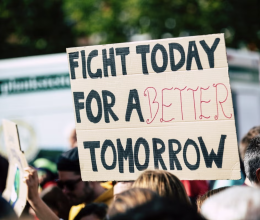
The ACLU of Maine is Prepared for a Second Trump Presidency: A...
November 6, 2024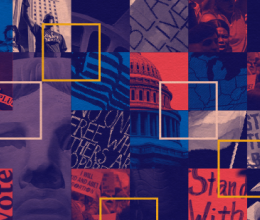
How the ACLU Will Protect Rights Over the Next Four Years
November 7, 2024
Maine's Cooperation with U.S. Immigration and Customs Enforcement
April 14, 2025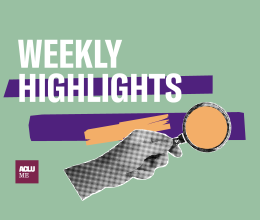
Weekly Highlights: April 7 – 11
April 11, 2025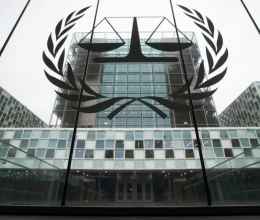
Human Rights Advocates Sue Trump Administration Over Sanctions...
April 11, 2025
Weekly Highlights: March 31 – April 4
April 4, 2025
Weekly Highlights: March 24 - 28
March 27, 2025